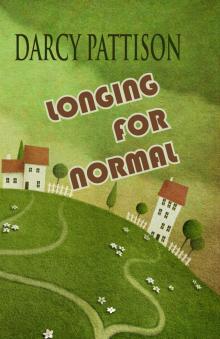- Home
- Darcy Pattison
Longing for Normal Page 6
Longing for Normal Read online
Page 6
Miss Porter leaned over the kitchen counter. I sighed, and figuring it would be a long conversation, I closed the fridge and settled on a barstool. Waiting.
She talked rapidly about a party at the Country Club tomorrow. She did special events for the club and was coming and going all the time. Didn’t have regular office hours. She did parties, weddings, luncheons, anything that someone wanted done, she could make it happen, she bragged. Even her son’s golf career: she had gotten him free lessons from the club’s pro.
While she talked, Miss Porter shrugged on the navy jacket of her business suit and brushed off the bottoms of her feet before slipping on her heels. “Yes, I can be there in five minutes.”
She snapped her cell phone closed and turned to me. Mr. Porter, her brother, had an ugly complexion. Hers? Pink and perfect. They had the same light brown hair, though, and the same gray eyes. “Problems about the food for the McGuire’s party. So, I’m off again. Tell my brother not to wait up for me. Where is he anyway?”
“Bowling league.”
“Oh. That’s why you wanted money. For supper?”
“Yes, ma’am.” I had her attention, my hopes raised again, I hopped down, “Let me show you—”
But she waved me off. “I know it’s empty.”
I doubted she knew that the refrigerator was almost totally bare. It was never that way at Ted and Mandy’s, even when Mandy forgot to stop by the grocery store. Always something in the fridge or the cabinets. You might not like dill pickles and crackers, but they were something to eat. Here, the fridge had a six-pack of pomegranate juice, a six-pack of light beer, and a small jar of green olives. Not the good black olives, but the green ones with something red stuffed into them.
It wasn’t much of a supper, pomegranate juice and stuffed green olives.
Miss Porter jerked open her leather briefcase and rummaged around. Then she snapped it shut, her long red fingernails almost catching in the latch. “Sorry. I only have a debit card. I never keep cash anymore.”
Almost desperate now, I flung open the refrigerator. “There’s nothing here.”
“I told my brother to stop by the store the day before you came, but he was too busy, helping get that back to school party ready.” She paused. “Oh, I meant to bring in something.”
She went out the back door to her car and brought back a large flat white box. “Leftovers from today’s luncheon.” She slid the box onto the counter and opened it. About 100 cream puffs, tiny ones. They smelled sweet and I saw that some had chocolate, some vanilla filling.
“Eat what you want. Sorry, but I have to go. I’ve just got five minutes to get there. When my brother gets home, ask him to get you a burger, and he can shop tomorrow.” Miss Porter opened the back door and strode calmly to her car.
Now, cream puffs are good. But they aren’t a supper.
I jerked open cabinet doors, searching. Not even a box of cereal or a can of soup. After 48 hours with the Porters as foster parents, as the succedaneum for my own parents: (Succedaneum: Latin derivation. Definition: a substitute. S-u-c-c-e-d-a-n-e-u-m. The 2001 winning word for the national spelling bee.)
Here’s the progress report on the Porters:
Good–no one was going to bother me much here.
Good–No chores because they hired a maid to come once a week, they both ate out most of the time, Mr. Porter took his shirts and pants–and my school uniform–to a laundry service.
Bad–I was truly on my own. Including where I would get my supper tonight.
I leaned over the cold kitchen counter and ate a chocolate cream puff. It was fresh and soft, and the pudding was a deep chocolate. I ate another.
According to Miss Porter, who liked to explain her brother, I was here because of their feud. Mr. versus Miss Porter, brother versus sister. They had lived in this house together for years. Miss Porter was divorced, and her only son, Tim, graduated last May and went to college this fall on a golf scholarship. He traveled with his dad all summer, so his room had been empty for three months, and that had started arguments.
Mr. Porter: We have this big empty house and some poor foster child needs a home. Besides, I miss Tim.
Miss Porter: I’ve raised a son. I don’t want any more kids. But if you want to do it, go ahead. I dare you.
It was the dare, of course, that made Mr. Porter go through with the application process and the first training session. Because of the dare, I was here.
I slammed shut every cabinet door. Feeling distinctly forlorn, I flopped in front of the huge screen TV with the box of cream puffs and my picture album and started flipping channels. At least Mandy had made sure that I had an album with all my pictures; I hadn’t had to search for them. It was red leather outside, and pictures were slipped into plastic sleeves. Nothing labeled, but it looked like it was all in order, staring with first grade.
Let me say: sitting alone and eating junk food and looking at old pictures of your old family is not fun. By 8 p.m., two empty pomegranate juice bottles and a half empty box of cream puffs sat on the table in front of me. I had eaten all the chocolate-filled ones.
A car pulled up in the driveway, and a car door slammed. I went to the kitchen to meet Mr. Porter.
“Hey.” Mr. Porter waved good-bye to someone in a black car, then stepped inside. He nodded toward the living room. “You watching something good?”
“No. Just waiting for you to come home for supper?”
His eyebrows went up and his jaw dropped a bit. “Oh.” He shrugged. “Well, I ate a burger at the bowling alley.” He walked through the kitchen to the living room.
As he passed me, I wrinkled my nose. He smelled like beer or wine or something.
Seeing the box on the table, he leaned over, took a cream puff and popped it into his mouth. “Looks like you had dessert already. Too bad she didn’t bring home any chocolate ones; they are the best.”
My throat tightened. Did these Porters understand nothing? “Yes, that’s all I had to eat. The refrigerator is empty. The cabinets are empty. Can we just drive through somewhere and get me a burger? Please.”
“No,” he said. “Can’t go out again. I had two beers and caught a ride home. Designated driver, ya know what I mean? Left my car at the bowling alley.”
Well, at least he didn’t drink and drive. That was good.
“Tonight,” he said, “was my last chance at some fun before I have to spend evenings grading papers. Ya know what I mean? Just fix yourself something.” He burped.
I had been neglected all evening, left alone with the cream puffs, and I was about to be mad. I said in a calm voice. “Maybe we could order a pizza? Have it delivered?”
He dropped onto the couch. Obviously–not listening. He stared at me for a minute, his eyes unblinking. Then he lay down, curled up and closed his eyes. And just like that, my chance of a pizza disappeared.
I grabbed my picture album and stomped upstairs to my room and stood in the doorway, thinking again how much I hated this room, Tim’s room. Along one wall was a putting green. Tim, like Mr. Porter, was crazy about golf. Was going to college on a golf scholarship, they said. Mr. Porter supposedly had a putting green in his bedroom and one in his classroom at school, too.
Worst thing about my room? The leftover smells. Dirty socks smell. Heavy cologne smells. UFO smells. Foul, that’s what it was, both the smell and how the Porters had treated me tonight. I kicked off my shoes and lay stiffly on top of the covers and turned off the lamp. I crossed my arms over my chest, but then I had to hold my nose. My stomach hurt, so I tried patting it softly, but then I had to hold my nose. I was so miserable: I had chocolate-pomegranate breath, and I just wanted a bag of chips. That wasn’t asking much. Just a small bag of salty chips.
I should have just gone to sleep. But even more than the hunger was the worry about Mandy and her baby.
When I got here, the social worker and Mr. Porter both said I shouldn’t try to call Mandy. But that was crazy. Well, Mr. Porter would be asleep for hours
now.
I went to the hallway and picked up the house phone. Quickly, before I could think about it, I called the familiar number.
And Ted answered, “Hello.”
I tried to make my voice deep, “Mandy Payne, please.”
There was a pause. Then Ted said, “Alli, I know it’s you.”
I was quiet. He had never liked my voice, always telling me to talk softer. At first, I tried talking quietly, or even whispering, but that wasn’t what he meant. “Your voice is harsh. Can you make it softer?”
I never figured out what he meant or how to change my voice.
Before he could yell at me for calling, I hung up.
I went back and lay on my hard bed, on an itchy blanket, quivering with rage. Home. What did Ted know about a home?
I should have just gone to sleep. But I was eleven and a half years old. Almost twelve. And teenagers NEVER got adopted. Everybody knows that.
Somehow, I knew–had known for a long time–Ted and Mandy wouldn’t adopt me, but that had been okay because I would still live with them, and not have to move until I graduated from high school. But now–
I took the red album and buried it under my clothes, where I wouldn’t have to look at it again. I had to take care of myself. No adults to help.
I just wanted one small bag of potato chips. After endless cream puffs, something salty.
Well, I was going to eat something more than cream puffs tonight. Somewhere. Right now. I got up and groped around for my shoes and put them on.
ELIOT
Cradling the container of sourdough starter, I followed Marj back into the living room for our serious talk, glad the suspense was almost over. Marj sat on the sofa; I perched on the other end.
Marj rubbed her temples with her thumbs and sighed. She slipped off her flip-flops, then pulled up her bony knees and hugged them, her chin resting on her knees, staring at me. “We need to talk.”
I caught myself drumming the side of the jar and forced my fingers to be still. I waited.
“You saw the envelope.” A statement, not a question.
I nodded and hugged the jar–a cold, hard security blanket.
“You probably guessed, it’s the adoption papers. I just don’t know what to do.”
I looked at her face, but she dropped her gaze. “Sign them?” I whispered, but too soft for her to hear.
“Without Griff,” she said, “everything is so hard. I’ve never been a mother. Never even owned a house before. Just lived in apartment complexes. There, if anything goes wrong, you call the manager, and it gets fixed. And you never worry about grass.” She waved toward the back yard. “That grass out there–” she sighed deeply and sagged, “– it never stops growing.”
A warm flush swept through me, and I was embarrassed I hadn’t thought to do the mowing. “Grass? Is that what’s bothering you? I can mow. Right now, if you want. I can keep that done. Yard work, I can do that. I swear, I can keep it all done.”
Marj grimaced. “No, it’s not just that.”
Now, I set the sourdough jar between my feet and sat on my hands to make sure I was quiet. She liked it when I was quiet and listened.
“You know that Griff and I were high school sweethearts?”
I nodded, interested as always in Griff’s background, his life.
“But we lost track of each other,” she continued. “I married someone else. Jack was, well, he was great, but we couldn’t have children. And then, he got cancer and died four years ago.”
“Oh.” That I hadn’t known. Griff just said he met his high school sweetheart and wanted to date her again. Nothing about a first husband, especially one who had died of cancer.
“When I met Griff again,” Marj said, “it was like a dream. He was so strong and confident. With Griff beside me, I felt like I could climb Mt. Everest.”
Oh, yes, I knew that feeling.
She stopped talking, so I risked a glance. Her eyes were half closed, and she was half smiling; then, her brow wrinkled and she squeezed her eyes tight, like she was trying not to cry.
Yes, I thought, memories of Griff were hard. But good.
Squinting, Marj whispered, “I don’t know anything right now. Except that everything is difficult with Griff gone. And I didn’t count on being the single mom of a twelve-year-old boy. Without Griff, well—” she hesitated.
I looked away, staring at the dark TV screen. I waited.
“—well, maybe it would be best to stop before we get started.”
“But. We’re a family.” Her words stung, but I couldn’t think about the hurt. I had to make her understand that we had to stay together. We had been a family for four weeks. Marj and Griff married early that summer and took a two-week honeymoon. When they came back, we all had a week together before Griff got sick. That week, we had filed papers for Marj to officially adopt me, too.
“Are we? A family?” Marj shook her head and sat up, planting her feet on the ground and leaning forward to speak with a firm voice. “Don’t think me harsh. This is just more than I ever expected and I’m not ready to be a single mom. I’ve already talked with your old social worker and explained my hesitation. They are experts in children; they’ll know what to do. They said you could move to a foster family this fall. They have a family ready for a boy. A really nice family. Who will know how to take care of you much better than I can. They are experts in children.”
Confusion swirled around me. Marj believed what she was saying, that I’d be better off with a foster family. It was true, in some ways. Marj didn’t know things about kids, like not even thinking about giving me an allowance. But she had no idea how bad foster care could be. From between my feet, I picked up the sourdough jar, unscrewed the top and leaned over for a deep breath. And time stood still.
Home. The sharp smell of sourdough always brought memories of Griff. On one of my first visits to Griff’s house, four years ago, when I was just a foster child for another couple, we made our first loaf of bread together. It was a long holiday for Presidents’ Day in February. My foster family went on a family trip, so Griff invited me to stay over. Friday night, Griff pulled a glass jar from the fridge. “Ever make bread?”
I tapped the jar, puzzled. It seemed to be full of a yellowish-white liquid with foam on top. “No. Doesn’t bread just come from the store?”
Griff launched into a big lecture on sourdough. He was like that, knew so much about science and the world. Loved explaining things. Not like lecturing from a teacher, so much as giving me a gift of knowledge.
Griff’s voice still echoes in me, like echoes from a booming voice would linger for a long time in a canyon: Sourdough, he said, is made from a combination of yeast and bacteria. The yeast gives off gases that makes the bread light and fluffy. The bacteria gives it a sour taste. Today, most breads rise too fast and the bacteria doesn’t have time to develop that sour flavor.
Taking off the lid, he held out the jar.
I took a whiff. “Stinks.”
“Heavenly smell,” Griff said and grinned that huge grin that showed his one false tooth in the front of his mouth. “Kinda like dirty socks.”
That smell, that amazing smell, followed us all weekend as the bread rose, was punched down, and rose again. Finally the loaf came out of the oven, and Griff slathered it with real butter and handed it to me.
I chewed and considered.
“Well?” Griff demanded.
I made him wait, taking another bite and leaning my head from side to side.
“Well?”
I gave in and giggled. “Heavenly,” I said, using Griff’s word.
And Griff beamed, lighting up a place in my heart that I thought would never be lit by anyone again.
Suddenly, I thought of Alli, living with the Porters. I could not go back to being a foster child, I could not.
Panic rose now, and I breathed faster. Marj had to understand. She had to give us more time. Time. Griff would understand: it took him two years to decide to adopt me. Ta
king time to make a decision was fine, as long as Marj and I stuck it out and tried. Griff had truly loved Marj, and that meant she was a good person. We just needed time.
I screwed the lid back on the jar. Then stared at it like I had never seen if before. A minute ago, the Bread Project had seemed impossible, almost a thing that would disrespect Griff. Something that would leave me exposed, hold my grief up for everyone to see. But maybe Dad had left me one last thing, a way to convince Marj to give us time, time to get to know each other, time to become a family.
I looked up and blurted, “What about the Bread Project? We want to make it work, right? To honor Griff and his memory. Right? We have to work together. You work with the PTA, and I get the kids excited. Right?”
Marj opened her mouth, and then shut it.
Maybe she was rethinking her decision. I pressed harder. “The Bread Project has to succeed. For Griff’s sake, we have to see it through. Together. Right? Through Thanksgiving. We can’t change anything until after Thanksgiving. At least. Right?”
“O-k-a-y,” she said slowly, reluctantly. “I do want the Bread Project to be a success. We could wait until Thanksgiving to decide something about the foster family.”
My shoulders sagged in relief. Time. We had time. A chance at Marj as a real mother–it was worth people poking around in my feelings. The final success or failure of the Project–well, it would probably fail but that didn’t matter. What I really needed was as much time as possible. But this was going to be tricky. The Project would be like a time bomb that would go off when the timer stopped. I had to keep winding the clock. The Bread Project had to start well and keep going.
And in that space of time, from now to Thanksgiving, I had to convince Marj that we were family, that she should sign those papers.
“But I really don’t know what to do with a house like this.” Her voice was brisk again. “I met Mr. and Mrs. Johnson at the party yesterday. They paint and fix up houses. We set up an appointment to look things over and get an estimate. Get it ready to sell. We’ll go on and do that. It will make it easier to move on—if that’s what we decide.” She saw that I was about to speak, so she raised a hand. “Like Mrs. Lopez said, it’s still hard for me to make decisions. I get so sad sometimes—” She trailed off and squeezed her eyes shut again.

 When Kittens Go Viral
When Kittens Go Viral The Wayfinder
The Wayfinder Sirens
Sirens The Girl, the Gypsy & the Gargoyle
The Girl, the Gypsy & the Gargoyle Saucy and Bubba
Saucy and Bubba Longing for Normal
Longing for Normal Kell, the Alien
Kell, the Alien Sleepers
Sleepers Vagabonds
Vagabonds Sleepers (The Blue Planets World series Book 1)
Sleepers (The Blue Planets World series Book 1) Pilgrims (The Blue Planets World series Book 3)
Pilgrims (The Blue Planets World series Book 3) Pilgrims
Pilgrims Kell and the Horse Apple Parade
Kell and the Horse Apple Parade Sirens (The Blue Planets World series Book 2)
Sirens (The Blue Planets World series Book 2)